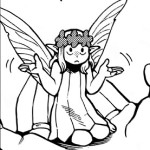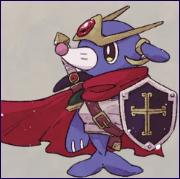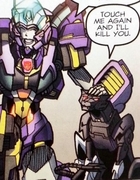|
neonchameleon posted:I'm not sure just who you think you are engaging with here. I mean I specifically mentioned the barbarian as the class that should be the simple one. "I rage and smash" works well as a combination. I also brought up the pyromancer as another good example of a simple class in the post you are replying to. So please stop it with this "always" and deal with the actual discussion in the conversation. You know what? Fair. I get too salty about the training wheel onboarding class thing and I should knock it off. Thanks.
|
|
|
|

|
| # ? May 26, 2024 08:18 |
|
Kai Tave posted:I have had people genuinely and sincerely argue to me that they would rather have a game where, for example, everyone's to-hit bonus goes up by 1 and everyone's defenses go up by 1 each level (thus achieving nothing except making the numbers bigger) versus the exact same game where those numbers don't go up. BlackIronHeart posted:I also know players who play to see Number Go Up and the associated dopamine drip that comes with it. What if that was abstracted to "you get something, anything" and not necessarily character abilities? Like, what if "advancement" was in prestige, or noble titles, or ever-fancier artwork to hang on your clubhouse walls, or ever more planets where you have a standing death sentence, or you just gradually get closer to solving the big long-term campaign problem? I get the dopamine hit part, but I don't get the requirement that character advancement specifically in the D&D way is a prerequisite for long-term play. I've been playing a star trech gacha game on my phone for years now, and I do not care even one tiny bit about my "level" in that game; but I do enjoy collecting my little dollies, I have over 400 crew and it's always fun to get more. Just keep letting me put my little star trek characters on a shelf and I'm happy. Number go up is just the grind they're making me do in order to earn my dollies.
|
|
|
|
The Bee posted:At this point, its hard to argue that Paizo's made an industry out of pointing out Wizards' fuckups. They're shrewd marketers, especially compared to Wizards' strategy of "gently caress you, we're D&D." They're not afraid to make moves that indirectly benefit them, like the ORC, whenever they're in the shadow of another big mistake. My understanding of the Paizo timeline: - Wizards makes 3.X, would like to outsource a lot of support to third parties. The OGL is part of that strategy; another part is licensing out the production of Dragon and Dungeon to Paizo. - As a result of being the folk who make Dragon and Dungeon, Paizo end up in a good position to make themselves well-known to the 3.X fanbase; even the sort of people who only play D&D and don't otherwise go for third party stuff get some Paizo exposure, because they're putting out the official magazine. - Wizards pull the Dragon and Dungeon licence (with 5 months notice, don't get your engrams restimulated Splicer), but because they've been able to make themselves well-known to the 3.X audience, and thanks to the OGL being a thing, Paizo are able to smoothly shift to doing Pathfinder adventure paths. - Wizards decide to shift away from OGL 1.0a - leaving it alive, but putting out 4E under the GSL instead. This prompts a controversy which Paizo are, due to the above factors, perfectly poised to make bank on by making their own game. My understanding of the Kobold Press timeline: - Wizards makes 5E, would like to outsource a lot of support to third parties. Returning to the OGL is part of that strategy; another part is licensing out the design of Tyranny of Dragons to Kobold Press. - As a result of being the folk who make the first big campaign for 5E (one which gets rereleased on the regular, at that), Kobold Press end up in a good position to make themselves well-known to the 5E fanbase; even the sort of people who only play D&D and don't otherwise go for third party stuff get some Kobold Press exposure, because they're credited with designing a major campaign (and sufficiently few 5E books come out that it's much more likely your group gets around to Tyranny of Dragons sooner or later than if there were tons of official adventures). - Wizards pivot away from outsourcing design work to Kobold Press, but because they've been able to make themselves well-known to the 5E audience, and thanks to the OGL being a thing, Kobold Press are able to smoothly shift to putting out their own 5E material. - Wizards make a hamfisted attempt to kill OGL 1.0a, eventually leaving it alone whilst dumping SRD 5.1 into Creative Commons in a panic whilst pissing and making GBS threads themselves and turning into a corncob whilst insisting that everybody won in this situation. This prompts a controversy which Kobold Press are, due to the above factors, perfectly poised to make bank on by making their own game. Absolutely wild that Wizards should be repeating the history of engaging with a third party company, giving that third party significant exposure with their audience, and then kicking off a controversy with the licensing which drives the audience into the arms of that third party company. Once is an accident but twice is carelessness. I would also posit that the above fits Marx's "first as tragedy, then as farce" pattern to a tee. Warthur fucked around with this message at 01:24 on Feb 8, 2023 |
|
|
|
MuscaDomestica posted:One thing that we can agree on was the White Wolf campaign where they said people should try a better more balanced game… Exalted Second Edition was not a good idea. I remember that. They literally offered to have people hand in 3.5e PHBs in exchange for a free copy of the Exalted core book. Called it "upgrade your gaming" lmao. Name Change posted:I mean, that's basically what it was. Improvements were generally mild, no systemic problems were really solved IIRC. Today if you released a book where the selling point was a patch to some classes and powers (that broke several other books), it would be laughed at. 3.5e addressed a few minor concerns about how the Paladin and Fighter classes were 1 level "dip" classes in 3.0 by spreading class features out. Aside from that 3.5e gave Druids the Natural Spell feat and the ability to spontaneously cast Summon Nature's Ally like a Cleric could spontaneously cast healing spells. Great life choices all around. Nuns with Guns fucked around with this message at 01:26 on Feb 8, 2023 |
|
|
|
Some kind of mechanical progression also feels appropriate alongside a character's personal progression. Number Go Up is the simplest way to do it, but basically if your capabilities don't progress much or at all then you feel a lot less like your character actually has changed, because a person's capabilities tend to change as they do. Even if enemies rise to maintain rough parity, you're still conveying the idea that the character is moving up to greater challenges.
|
|
|
|
MuscaDomestica posted:One thing that we can agree on was the White Wolf campaign where they said people should try a better more balanced game… Exalted Second Edition was not a good idea. Didn't it work though? It's easy to overlook it now because of the clusterfuck around Third Edition's production but time was when Exalted was kind of a big deal. Sure, the idea that it was better and more balanced than 3.5 D&D is... a stretch. But it's a recurring theme of this thread that the market doesn't care about rigorous design as much as you might hope, and if you hook new customers into Exalted and the game does well, then your advertising did its job.
|
|
|
|
Warthur posted:For what it's worth, literally the first time I became aware of anyone relating Paizo losing the Dragon/Dungeon magazine contract to them spinning out Pathfinder into its own RPG was in this thread. Wizards didn’t “let” Paizo keep the contact list. Wizards left them holding the bag on paid subscriptions Paizo had to fulfill but without the license to continue the magazines (Dragon and Dungeon) subscribers had signed up for. If you dig back into Paizo’s website around the time of the changes (and I think it might be in Dragon too) there’s some pretty frank conversation about “we legally owe you issues we cannot legally produce” so as an alternative people could roll their subscriptions over into the Pathfinder AP (this is why Paizo had to launch it immediately so they could fulfill their legal requirements), Amazing Stories or another Paizo mag, or get refunds. And if I remember correctly the stuff in question is pretty clear about “if everyone requests refunds we’re done.” Wizards did everything they could to gently caress over Paizo during that transition.
|
|
|
|
Nuns with Guns posted:I remember that. They literally offered to have people hand in 3.5e PHBs in exchange for a free copy of the Exalted core book. Called it "upgrade your gaming" lmao. 3.5's biggest change was the way damage resistance worked, which was a huge upgrade over the "I'm sorry, you need a +3 weapon not a +2 weapon to significantly hurt this guy" that 3rd edition retained from 2nd, though 3rd's verison was less harsh.
|
|
|
|
Leperflesh posted:Is it no fun if a long-term game doesn't have continuous character advancement? Or if the game system offers some maximum advancement, it stops being fun to keep playing beyond that point? BlackIronHeart posted:I also know players who play to see Number Go Up and the associated dopamine drip that comes with it. Leperflesh posted:What if that was abstracted to "you get something, anything" and not necessarily character abilities? Like, what if "advancement" was in prestige, or noble titles, or ever-fancier artwork to hang on your clubhouse walls, or ever more planets where you have a standing death sentence, or you just gradually get closer to solving the big long-term campaign problem?
|
|
|
|
Frankly, a big part of the reason indie titles don't have insane levels of progression is simply because that's a huge amount of content and they need to get something out the door (either for their financial sake or their sanity). Especially if your game deals heavily with Numbers and balancing those numbers - a 1-3 person indie team simply doesn't have the ability to make 30 levels of progression or whatever in a reasonable time frame.
|
|
|
|
Leperflesh posted:Is it no fun if a long-term game doesn't have continuous character advancement? Or if the game system offers some maximum advancement, it stops being fun to keep playing beyond that point? First there are some games which stop being any fun if you advance too much; if you're regularly rolling +4s in something PbtA or four dice in something Forged in the Dark the game just stops being fun other than for one triumphant final session because the challenges melt. But the big issue isn't that continuous character advancement is required for fun, it's that character stasis is grating. You've been through $EpicAdventure and what have you learned? Nothing. Mechanically (and therefore in the eyes of whatever the game rules care about) you're exactly who you were before the whole thing kicked off. And if put into a similar situation you'd have the same chances of succeeding at anything. Levelling up, D&D style, is probably the worst way to do this because it's very cookie-cutter in terms of growth. Skills are better because they also add an element of refocus to the character or actual transformation (one character I had in a sci-fi game started as a struggling rogue/thief type, easily overlooked, but turned first into the ship's engineer because he had a little skill in engineering and they needed one - and by the time he was done he was a galactic level strategic asset because no one else had remotely his skill and experience with progenitor tech). Genuine character transformation which when you look back at it wasn't inevitable. And it couldn't have happened without character advancement. And harder transformations, Apocalypse World style, can make for amazing RP moments. One that springs to mind was the Brainer getting poisoned then shot in the head and left for dead. Life became untenable so he came back as a different playbook, his consciousness inhabiting his mask and he came back as a Faceless out for revenge. Or at the softer end of the spectrum the Battlebabe realising that someone had to look after those idiots in that commune and becoming the replacement Hocus. But although D&D style levelling does it badly and there is far more to be gained from either skills or playbooks D&D does at least something.
|
|
|
|
Kai Tave posted:I have had people genuinely and sincerely argue to me that they would rather have a game where, for example, everyone's to-hit bonus goes up by 1 and everyone's defenses go up by 1 each level (thus achieving nothing except making the numbers bigger) versus the exact same game where those numbers don't go up. That's very important if NPCs have levels independent of yours!
|
|
|
|
sweet geek swag posted:3.5's biggest change was the way damage resistance worked, which was a huge upgrade over the "I'm sorry, you need a +3 weapon not a +2 weapon to significantly hurt this guy" that 3rd edition retained from 2nd, though 3rd's verison was less harsh. That's debatable even beyond the bard and ranger (and to a lesser extent druids) rewrites. I'd say Square Horses came up more (horses moving from 10ft*5ft to 10ft*10ft). And then there were the magic changes; there were a huge number of rewritten spells and spell resistance and spell immunity were significantly downgraded (in particular not protecting you from the conjuration school any more) meaning it was much easier for wizards to counter everything.
|
|
|
|
Warthur posted:OK, here's a good opportunity to bridge away from the eternal battle of 4E likers and 4E haters all re-enacting their edition war trauma and go back to talking about current industry stuff, because Kobold Press's current position in this situation actually has some very interesitng parallels with how Paizo ended up in a position to do Pathfinder. Seems right from what I can tell! And thanks to the OGL changes, Kobold Press and Black Flag can pivot from "we're making our own system due to the OGL shutdown" to "we're positioning ourselves as the true stewards of 5E content." You can already see the language change in their first few press releases. Black Flag, initial announcement posted:"As we look ahead, it becomes even more important for our actions to represent our values. While we wait to see what the future holds, we are moving forward with clear-eyed work on a new Core Fantasy tabletop ruleset: available, open, and subscription-free for those who love it—Code Name: Project Black Flag." Black Flag, once Wizards backed down posted:Project Black Flag will embrace 5E and expand upon it. Our goal is to keep 5E products vibrant and available in print and on our VTT partner platforms. Project Black Flag is one step in making this a reality. I honestly get the sense they'd be making this move in either case, but you can plainly see the difference in how they expected to move depending on how much of 5E they were allowed to keep.
|
|
|
|
The Bee posted:Seems right from what I can tell! And thanks to the OGL changes, Kobold Press and Black Flag can pivot from "we're making our own system due to the OGL shutdown" to "we're positioning ourselves as the true stewards of 5E content." You can already see the language change in their first few press releases.
|
|
|
|
Leperflesh posted:Is it no fun if a long-term game doesn't have continuous character advancement? Or if the game system offers some maximum advancement, it stops being fun to keep playing beyond that point? I don't think it's essential, but there's a reason games tend to offer character advancement, and that's because it's fun. There are certainly other ways to have fun, but one of those ways running out, particularly when it's the primary way the system has to represent growth, is rather disappointing. Which isn't to say the way D&D does it is particularly good. Character levels are a pretty blunt way of doing things and a game designed around smaller but more frequent advancements I think does it much better. It's one of the reasons I really appreciate Burning Wheel as a good super long term game. But I'd like having more variety in my choices than just that.
|
|
|
|
Leperflesh posted:What if that was abstracted to "you get something, anything" and not necessarily character abilities? Like, what if "advancement" was in prestige, or noble titles, or ever-fancier artwork to hang on your clubhouse walls, or ever more planets where you have a standing death sentence, or you just gradually get closer to solving the big long-term campaign problem? They were exceedingly specific that they wanted the number. This was in the context of discussing Lancer and the designer's more recent game ICON. Lancer has a numerical progression system which isn't 1-1, but does cause gameplay to shift and change when you hit the higher levels into something more rocket tag-y at times compared to the earlier tiers. ICON, meanwhile, started out with a progression system that was much more 1-1 "the numbers go up but nothing really changes," and as a result several drafts back ICON dropped that sort of progression entirely, there's no "every X levels gain +1 to-hit" and no corresponding increase to enemy stats either, you gain new abilities and can augment those abilities, you can gain and level up artifacts with new effects, but there's straight-up no numbers treadmill, and the people on the pro-treadmill side of the argument were clear that just gaining new stuff was not enough to scratch their itch, they wanted to see the number go up by +1 whether it actually did anything or not.
|
|
|
|
Warthur posted:OK, here's a good opportunity to bridge away from the eternal battle of 4E likers and 4E haters all re-enacting their edition war trauma and go back to talking about current industry stuff, because Kobold Press's current position in this situation actually has some very interesitng parallels with how Paizo ended up in a position to do Pathfinder. 5 months notice isn't that much notice to be honest. Lead time on physical books is looong. I know that the way Paizo talks about their pipeline nowadays it sounds like what they're releasing today began production over a year ago.
|
|
|
|
Warthur posted:I definitely get the sense that the Creative Commons thing has been a boon to Project Black Flag, both because it makes it easier for them to use stuff and because it means it's more likely Wizards will make big system changes in future so as to make their content less cloneable. Yeah. The OGL fiasco in the first place was a huge boon for Paizo and its ORC, but they got their biggest benefit at the start of the whole snafu. The final verdict was all Kobold's gain. They basically have the freedom to take anything they want from 5E, and don't even need the fig leaf of the OGL to get away with it anymore.
|
|
|
|
sweet geek swag posted:3.5's biggest change was the way damage resistance worked, which was a huge upgrade over the "I'm sorry, you need a +3 weapon not a +2 weapon to significantly hurt this guy" that 3rd edition retained from 2nd, though 3rd's verison was less harsh. Also, haste was hit with the nerfiest of sticks. No longer could you cast two spells as your two actions, and that meant that monster CR spiked in many conversion documents for high level monsters.
|
|
|
|
Epi Lepi posted:5 months notice isn't that much notice to be honest. Lead time on physical books is looong. I know that the way Paizo talks about their pipeline nowadays it sounds like what they're releasing today began production over a year ago. We're not even talking about books. We're talking about them getting the license pulled for magazines. Paizo had to produce product up until the end of that five month period for D&D.
|
|
|
|
I still think a LOT of the problems with Fighters come simply from how they're 'Fighters'. Like, every goddamn archetype of dude with sword who doesn't do magic that doesn't come under Rogue has to be covered by a single class, and that's kind of insane. There's lots of different kinds of mages to cover different mechanical and thematic archetypes, but then an incredibly generic named class covering way too much thematic ground.
|
|
|
|
Ghost Leviathan posted:I still think a LOT of the problems with Fighters come simply from how they're 'Fighters'. Like, every goddamn archetype of dude with sword who doesn't do magic that doesn't come under Rogue has to be covered by a single class, and that's kind of insane. There's lots of different kinds of mages to cover different mechanical and thematic archetypes, but then an incredibly generic named class covering way too much thematic ground. I mean, it's not like D&D's Wizard isn't also covering about nine or ten different archetypes' worth of "dude with magic" all wrapped up into one, and it's often been suggested "well what if they broke the wizard into a bunch of classes like Necromancer and Illusionist" but that never really gets to the crux of the matter which is that a lot of D&Ds just really do not want to give non-caster classes an equal share of buttons to push and levers to pull. The "problems" with the Fighter in that regard are entirely self-inflicted; no amount of archetype consolidation or thematic overlap would stop them from making a Fighter with as much cool poo poo as Wizards, it's just when they try that a bunch of people complain really loudly about it, and you can either ignore them and press on or play it safe.
|
|
|
|
on the topic of 3.0 vs 3.5, some of the changes also came up in the DMG: where in 3.0 you might still have extensive rolling tables for randomly generating a town and its demographics, 3.5 dropped some of it. Broadly, 3.0 was a more direct copy/conversion of AD&D-era material and its assumption of a fairly straightforward, randomly-generated dungeon hack-and-slash, while 3.5 matured the writing and design chops a bit and pushed more towards a somewhat narrative-focused campaign. ___ I also dug into my PDF collection and found the last Paizo-published issue of Dragon Magazine (issue 359, September 2007), with this as their advertised plan for the transition: 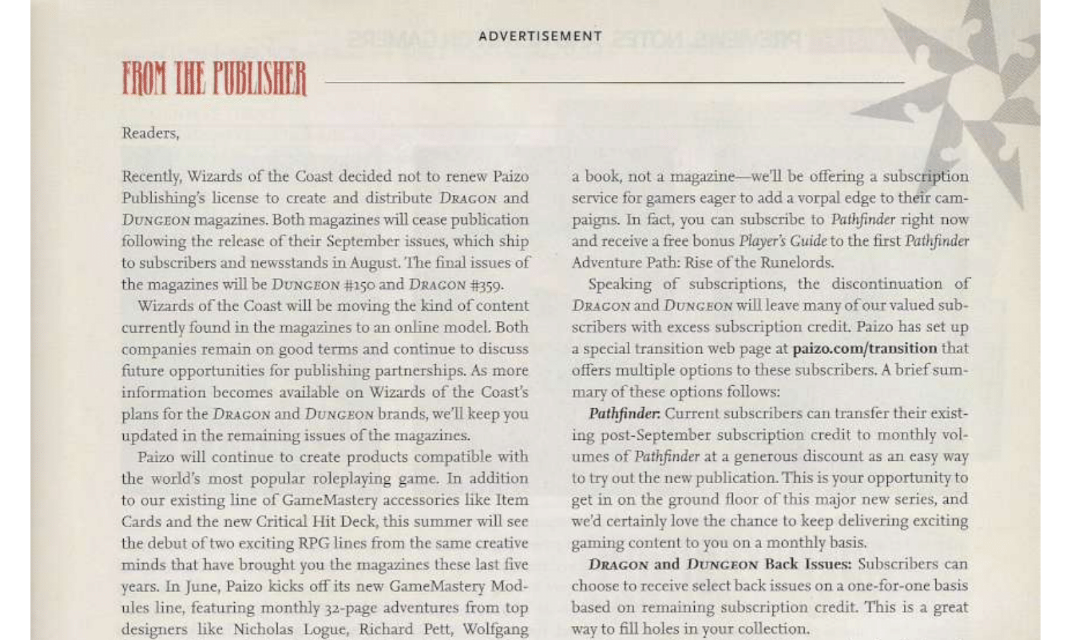 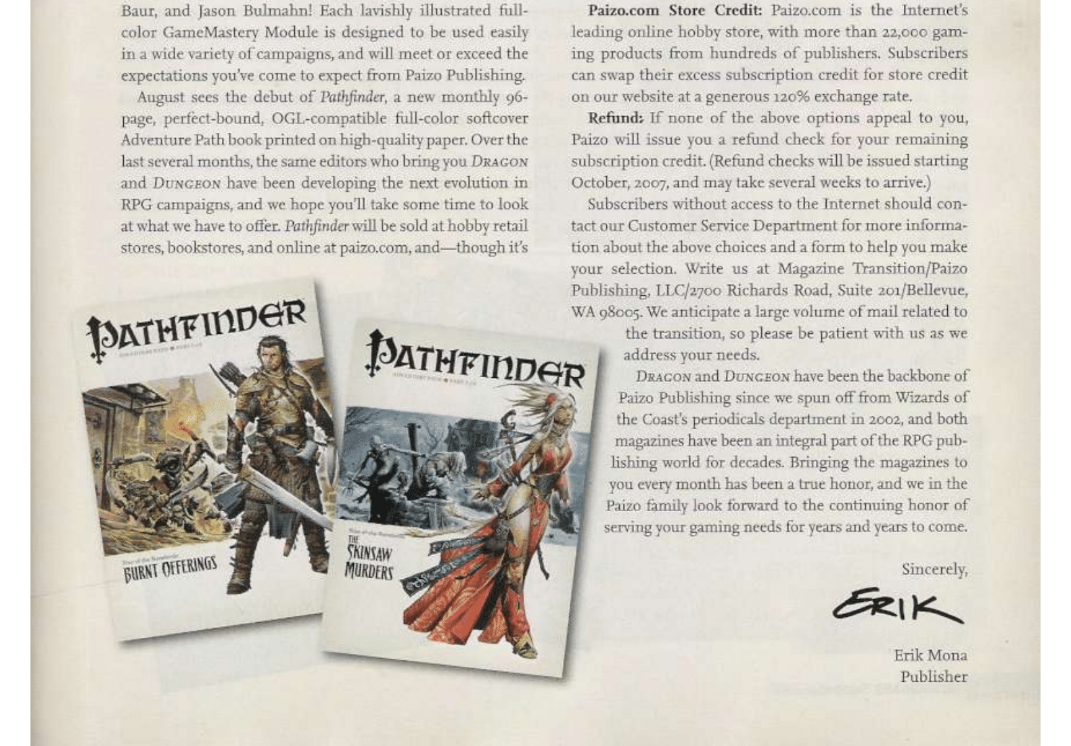 of note is that cover preview in the lower-left: "Burnt Offerings" is chapter 1 of Rise of the Runelords, which was released on August 29, 2007. I only have the Anniversary Edition from July 2012, at which point it was a dedicated Pathfinder product, but Erik Mona does also mention "GameMastery Modules", and those one I do have: 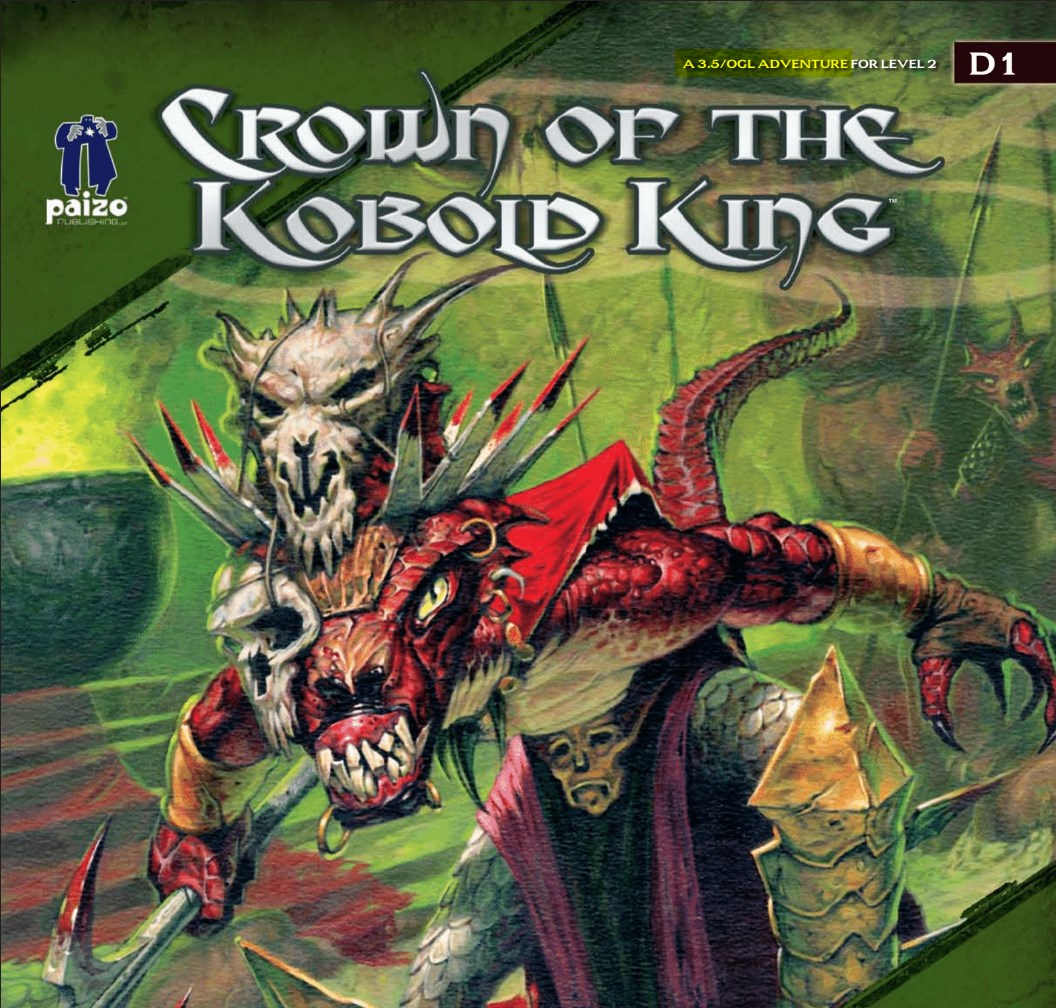 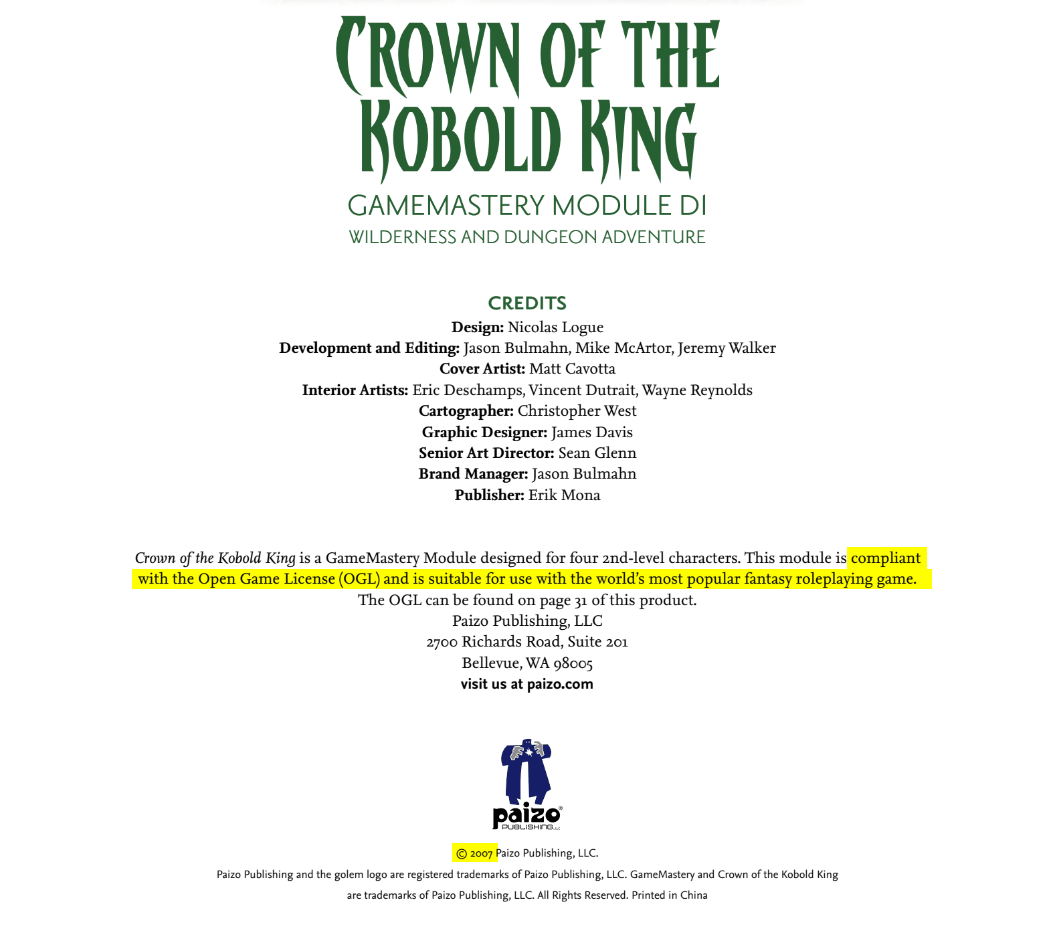 Crown of the Kobold King was published in June 2007*, and as you can see, still "requires" that you use it with 3.5 as a base. Beyond the Vault of Souls, released in July 2009, would be the last of these books that would advertise itself to be "a 3.5/OGL adventure", with "Crypt of the Everflame" being the first dedicated Pathfinder module, one month later. Pathfinder as a game unto itself had its first "Alpha playtest" document released in March of 2008, a "Beta playtest" in July of that year, and then the full release to coincide with Crypt of the Everflame. ___ * "Hollow's Last Hope" was released in the same month, as a free PDF to advertise this line of products and as a potential prequel to Crown of the Kobold King, but didn't have the "a 3.5/OGL adventure" line in the cover so I didn't use that as an example. gradenko_2000 fucked around with this message at 07:53 on Feb 8, 2023 |
|
|
|
Countblanc posted:Frankly, a big part of the reason indie titles don't have insane levels of progression is simply because that's a huge amount of content and they need to get something out the door (either for their financial sake or their sanity). Especially if your game deals heavily with Numbers and balancing those numbers - a 1-3 person indie team simply doesn't have the ability to make 30 levels of progression or whatever in a reasonable time frame. Colonel Cool posted:Which isn't to say the way D&D does it is particularly good. Character levels are a pretty blunt way of doing things and a game designed around smaller but more frequent advancements I think does it much better. It's one of the reasons I really appreciate Burning Wheel as a good super long term game. But I'd like having more variety in my choices than just that. Any class-based games that work like this? Splicer fucked around with this message at 13:46 on Feb 8, 2023 |
|
|
|
Hasbrooo https://twitter.com/BusinessInsider/status/1623151753087557636?t=Bpou61JVXcVPs5zNYeWZWw&s=19 quote:Hasbro stock has 29% downside potential as it continues to dilute the brand value of Magic: The Gathering.
|
|
|
|
Bobby Deluxe posted:Hasbrooo
|
|
|
|
Speaking of Kobold, they actually start their playtesting this month, beginning with the Talents and Heritages they mentioned on their blog.
|
|
|
|
Kai Tave posted:I mean, it's not like D&D's Wizard isn't also covering about nine or ten different archetypes' worth of "dude with magic" all wrapped up into one, and it's often been suggested "well what if they broke the wizard into a bunch of classes like Necromancer and Illusionist" but that never really gets to the crux of the matter which is that a lot of D&Ds just really do not want to give non-caster classes an equal share of buttons to push and levers to pull. The "problems" with the Fighter in that regard are entirely self-inflicted; no amount of archetype consolidation or thematic overlap would stop them from making a Fighter with as much cool poo poo as Wizards, it's just when they try that a bunch of people complain really loudly about it, and you can either ignore them and press on or play it safe. Didn't the 3.0 (Tome of Battle?) book designed to help fighters and other martials do more things make a lot of people flip out because it in fact gave them some interesting things to do which was a big no-no in the eyes of some?
|
|
|
|
The Bee posted:Speaking of Kobold, they actually start their playtesting this month, beginning with the Talents and Heritages they mentioned on their blog. And then there is, sigh, Cool Name Goes Here, which is already Kickstarting: https://www.kickstarter.com/projects/mechanicalmuse/cool-name-rpg-a-community-owned-fantasy-roleplaying-system
|
|
|
|
It was called the Book of Nine Swords and wore its wuxia/anime influence on its sleeve, how do you think nerds received it? 
|
|
|
|
The owner of the LGS keeps complaining about Wizards' decisions lately, but in a way that really exposes the contradiction of the game. Whenever we get excited for a reprint, he gets mad because it means the prices of singles go down. He also can't keep pace with sealed product because a booster box of the new set is $125 on Amazon, but $200 at the shop because he needs to make a profit. So people buy from Amazon because yeah of course they do in that situation. I don't know what portion of the business is singles vs sealed but he also has issues where singles are much cheaper on TCG Player, so people go there and he won't sell on the site because he'd basically be selling at a loss. But reprints are good for players because they bring down the price of singles, but bad for the stores because well now they make less money on those singles. People will buy packs but booster boxes are generally only bought by whales and people trying to save money but still feed their gambling addiction go to Amazon. Things that are good for players are bad for the spaces in which they play the game. Hmm, I wonder if contradictions like that are more common? Nah, must just be MTG.
|
|
|
|
Bobby Deluxe posted:
|
|
|
|
dwarf74 posted:Pfft, this is just a setup for an extended "bofa" gag BofA Ds - Dungeons and Dragons
|
|
|
|
Bobby Deluxe posted:Hasbrooo  This is totally expected, considering how consistent the bad press for them has been. Will they find the next unprovoked controversy to make it a hat trick? This is totally expected, considering how consistent the bad press for them has been. Will they find the next unprovoked controversy to make it a hat trick?
|
|
|
|
Leperflesh posted:Is it no fun if a long-term game doesn't have continuous character advancement? Or if the game system offers some maximum advancement, it stops being fun to keep playing beyond that point? To put it from a slightly different point of view, having a loop where the players are always fantasizing about what they want to do in future sessions is really useful towards keeping a long-term campaign going, or even for just getting a campaign off the ground. Having your players be able to build up all these fantasies of "oh, next level I get a new Feat and my build is really going to come online" or whatever is just super handy for keeping a game's momentum up and keeping people pumped. Like, hopefully the game's premise or story is also doing that--hopefully your players are fantasizing about what they want to do narratively next session as well, but having both is even better. I'm actually pretty negative on the impact of character builds on actual play, but they're pretty phenomenal for getting people looking forward to play, which is arguably even more important. But to tie this to the 'simple class' discussion a little, different people are going to look forward to and care about different things during play (which is part of why it's nice to have both--you can have something for everyone). I think it's pretty fair for someone to not care too deeply about RPG mechanics and still play RPGs--the tactical combat side of RPGs is something you can get from countless video games, but the more roleplaying side is something you can only really get from RPGs. Of course, that leads to the answer "so maybe they shouldn't play D&D and should play something more rules light instead", but D&D's market position makes that tricky. For any other RPG system I'd agree--I wouldn't really have much sympathy for someone who doesn't want to engage with the mechanics of Lancer, for example, but D&D kind of does need to support all types.
|
|
|
|
Well, poo poo. I know I wondered if C7 was too late to the party, but if this is what to expect out of their 5E compatible / C7d20 system work, my doubting rear end has been shut up.
|
|
|
|
Traveller, a game from about the same time period as D&D way back when, I think, somewhat faltered because of the rep for complex rules regarding spaceflight, but moreso, its fundamental methodology of working. Traveller used skills for everything, it had a fairly unified mechanic for everything player-facing. Your character was generated via a process, and you kinda got handed a set of attributes, skills, and maybe some money and items. It's hard to come out of that with a strong archetype, whereas D&D, for the most part, was giving you "you are Legally Distinct Aragorn, or Legally Distinct Legolas", strong archetypes that you know what you're getting, as opposed to a 30-something year old ex-navy dude who's ready to be part of a crew on a Free Trader just trying to get by. The former's just a more broadly appealing fantasy, I think.
|
|
|
|
Bobby Deluxe posted:Hasbrooo Wasn't it a BofA report that claimed D&D/WotC were "undercapitalized" in the first place?
|
|
|
|

|
| # ? May 26, 2024 08:18 |
|
I’m sure someone will identify one or more games that already do this, but there’s ways to handle “advancement” in an RPG that go beyond the boundaries of a character sheet. AD&D had “name level”, where you were assumed to gather followers and have some sort of political presence, though D&D has never done a great job articulating these systems or perceiving them as being advancement in the same way as getting more powerful spells. I ran a Birthright adaptation in the FATE system. Individual provinces of a nation were essentially treated like improvable magic items with associated “skills” that represented resources, PC holdings, and the like. It’s a short step from that to treating a nation like a PC and treating national improvement like PC level-ups or skill increases. Or you could choose a Destiny at 1st level: waif to hero; ending the scism; making a name; slaying the legend… While you might have one or more PCs associated with the Destiny, the main campaign advancement system would involve the Destiny acquiring more resources or necessary elements. If your waif in the Waif to Hero destiny dies in play, it might trigger a “descent into the Underworld” quest to revive them, but getting your Prince PC killed under the Ending the Scism destiny might allow you to bring in and play the Queen, who has a different set of abilities and powers. You could even use the Prince’s death to advance the Destiny, meaning that you’d actively oppose bringing the old character back as the Queen would go back to opposing his involvement instead of furthering the Destiny in his memory. Telling an interwoven story built around six Destinies might be tough, but you could instead have some players act in supporting roles and shift into the spotlight later. And you’d have a whole hell of a lot of advancement options beyond “number goes up” on a character sheet.
|
|
|










